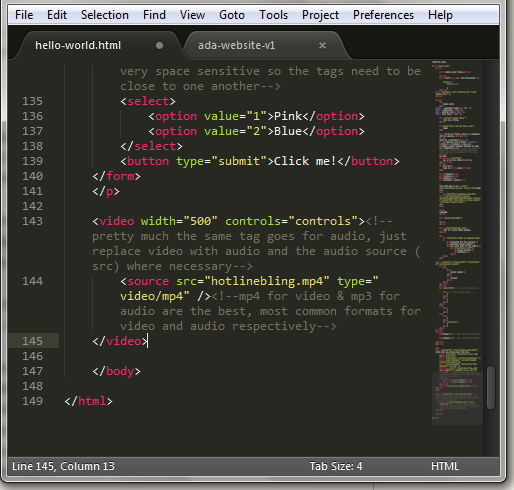It's part 2 of my study journal. I want to create a simple music website in HTML (you can read more about how I got the idea and what I want my website to be like here).
Yesterday, I finished off watching and following all tasks of the Kalob Taulien's lovely HTML course. I would like to quickly go into my thoughts on the course. Then, I will finish off with what my experience made me think more generally about learning to program.
Thoughts on the HTML course
Kalob is quick. He talks, writes code, explains it, and writes extra explanations retelling what he's just said just to make it clearer, and it all seems like a magician's trick at first, because he seems to be doing it all at the same time.
I can understand that to some people, he might be a little bit too rapid at times. A simple solution is to watch the videos twice (they are short). The first time, just try to absorb things and take mental notes. The second time, bring in an actual notepad and take extra notes.
That being said, personally, I loved that dynamic pace. It forced me to really focus on every single thing presented, and I felt like we covered a lot of material without waffle.
Also, extra explanations written in the code made me think of my favourite lecturers who would describe a lecture slide without being boring, add something interesting to the slide, but you can still get a lecture without their extra comments because what they are doing is clear. I am mostly a reader rather than listener so I appreciated that the course catered to different learning modes. And I had a chance to practice annotating code because I was taking my course notes while coding with Kalob which I found handy.

Other loose thoughts on what I enjoyed in the course throughout it:
- HTML DOM class. It was great that the structure of the code was explained in a form of a graph and on two levels. One level was more specific, of example specific HTML snippets themselves. The second level was more general, of the document object model and HTML syntax. Now I feel that I get both a detailed and a general picture of my code.
- Including both more basic and slightly more complex HTML where necessary was great. I already knew some HTML so getting my knowledge expanded was really useful.
- Tasks at the end of each course module are diverse. They are not just writing code. To refer back to the document object model class as an example, this module was about researching different structures as homework, not just looking at my own code. Homework wasn't boring and I felt more rounded by the end of it.
- I got to have some things explained such as what the difference between tags <b> and <strong> is, or how to create and implement favicons (icons in the page card in your browser). These are the things which I would always forget to research, and now I am aware of some subtle differences and elements of code.
- Kalob showed me good practices for the future, such as how to run a validation of your code which helps you spot mistakes or obsolete code. It will be useful in projects beyond the course.
HTML and language learning
Having taken the course, I feel that I got a good refresher of HTML and I was walked through the key concepts well. I am still a little bit shy about how my project will go but at the very least, I have some music, a plan, and key building blocks by now.
There was also a more general reflection the course brought me, going beyond this project I have in mind. Programming newbies often worry if you have to be good at maths to be a programmer, and the discussion always centres on your ability to crunch numbers (or lack thereof.) It is fair, especially if you want to do more data analytics-based computing.
But no one seems to really consider learning to program through the prism of language learning.
I find it really weird. Especially given that, in the end, we learn specific programming languages. So is it all boiled down to maths because the ability you develop in maths, of noticing abstract patterns, is key in language learning as well? Maybe. Or maybe it is just a relict of a subconscious stereotype that programmers are nerds, all nerds do maths...
But I was hit by with how my code modules reminded me of my language classes rather than my maths classes. And I am saying this as a bilingual girl with a background in humanities and a degree in psychology, which kind of put me in the middle of sciences and humanities because I do and like my statistical analyses but I also like my writing (with words.) I would say I am a nerd myself, just not a math nerd.
But then I realised: who actually cares?
And as a cognitive science/language nerd, I think we should go beyond this boring division of science vs humanities, or nerds vs non-nerds, in perceiving ourselves or learning to code. Let's just focus on finding patterns, being able to notice them, recreate them, synthesise them, and modify them. Whatever guides us, whether it is seeing relationships between words or between numbers, doesn't really matter that much. Let's cater for both people good at languages and at maths. It's all just different symbols we use for elements we can then connect in our minds, like my course helped me do. Being able to notice connections is the key skill. Let's focus on teaching about those connections.
